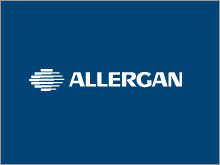|
The wrinkle wars heat up Medicis' dominance in the arena will be challenged by Allergan's new dermal filler, Juvederm. NEW YORK (CNNMoney.com) -- The market for wrinkle-removing drugs is about to get more competitive, as Allergan prepares to launch a product in the U.S. that could threaten Medicis' dominance. Allergan (up $1.39 to $107.84, Charts), the Irvine, California-based company that's best known for its wrinkle-removing Botox, is preparing its U.S. debut of the newly-approved Juvederm, a dermal filler that also smooths facial furrows but works in a different way than Botox.
Juvederm, already available overseas, was approved by the Food and Drug Administration on June 5. Its upcoming entry into the U.S. market could put the squeeze on Medicis (up $0.20 to $24.00, Charts), the Scottsdale, Ariz.-based maker of the dermal filler Restylane, which currently dominates the American market. David Pyott, the English-born CEO of Allergan who was recently honored for business excellence by Queen Elizabeth, said his rival Medicis was probably wondering, "When is the enemy going to show up?" "But I just want to be sanguine in the beginning," said Pyott, when asked about his strategy going forward. "I don't want to promise the moon." Dermal fillers, like Juvederm and Medicis' Restylane, remove wrinkles by injecting hyaluronic acid into the face, adding structure and plumpness to the skin. They work differently from Botox, a toxin that is injected into the skin to temporarily paralyze muscles. So while Allergan's Botox is not a direct competitor to Restylane, Juvederm soon will be. In addition, Allergan's Juvederm and Botox can be used together, since they work on different parts of the face. Similarly, Medicis' Restylane can work in conjunction with another one of its products, Reloxin, which is similar to Botox. Medicis CEO Jonah Shacknai said he'll soon bringing his product Reloxin to the U.S. to compete directly with Botox. "We have great respect for Allergan, but we believe they will face a very different environment from what they experience today with Botox as a monopolist," said Shacknai. Shacknai added that Restylane has aggressively competed with Allergan's Juvederm in overseas markets, and that he is looking forward to a "fair and clean fight" with Allergan in the U.S. "In every market of the world, Juvederm has failed to compete successfully with Restylane," said Shacknai. "[Juvederm] has been priced, in many cases, at half the cost of Restylane, and still Restylane is the dominant product in every market it's in." Face-to-face competition Both companies acknowledge that they will have to ramp up advertising in the upcoming head-to-head battle. And although both CEOs claim their respective products are superior, analysts say Juvederm and Restylane are quite similar. "Each company is going to make independent claims as to the differences between the products, but there are not significant differences," said Ken Trbovich, analyst for RBC Capital Markets. "We've spoken to a lot of physicians and we think the general consensus is that they're pretty comparable products," said Gary Lachman, an analyst for Leerink Swann. Medicis does not reveal its sales figures for Restylane, though analysts estimate that its revenues exceed $100 million annually, accounting for more than half of the U.S. dermal filler market. Trbovich said the introduction of Juvederm could cause short-term pain for Medicis' sales, which is already reflected in the 25 percent decline to the company's stock price year-to-date. But analysts also believe that the market for dermal fillers will expand to as much as twice its current size - or about $400 million. So Medicis could still see the dollar value of its Restylane sales grow, even as it loses market share. "Under the best case scenario, Juvederm enters the market and helps to grow the market. Even though they're taking market share, it doesn't necessary slow the growth to Restylane," said Trbovich. Breast implants But there is one area where Medicis will be unable to compete with Allergan: breast implants. Allergan beat Medicis in a bidding war in March to acquire Inamed, which is the original developer of Juvederm and also a major breast implant manufacturer. Medicis is not involved in breast implants. Shacknai said he has "no sour grapes," because he only wanted to acquire Inamed's Botox-competitor Reloxin, which he was able to do without taking over the entire company. In the breast implant industry, Allergan's main rival is Mentor Corp., (up $0.52 to $43.53, Charts) based in Santa Barbara. Both companies are expecting the FDA to approve their silicone implants later this year, ending a 15-year hiatus from the U.S. market for silicone. Jose Haresco, analyst for Merriman Curhan Ford, said that Allergan will find itself in a unique position as a "one-stop shop" in the aesthetics industry, offering a complete make-over package of Juvederm, Botox and breast implants. The analysts interviewed for this story do not own stock in the companies mentioned here. Related: The new skin trade |
|

